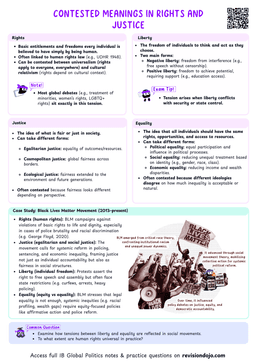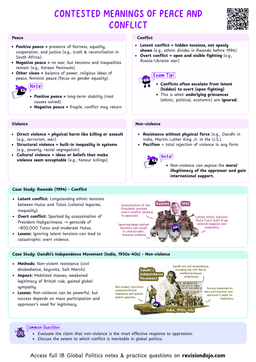Understanding Humanitarian Intervention
Humanitarian intervention
Humanitarian intervention refers to the use of military force by one or more states in another state without the latter's consent, with the primary aim of preventing or stopping widespread suffering or human rights abuses.
- This concept challenges traditional notions of sovereignty and non-intervention, raising complex ethical, legal, and political questions.
Key Debates in Humanitarian Intervention
1. Sovereignty vs. Human Rights
- Sovereignty is a foundational principle of international law, emphasizing a state's right to govern without external interference.
- Humanitarian intervention often requires violating this principle to protect human rights.
- Arguments for Intervention
- Moral Responsibility: The international community has a duty to prevent atrocities like genocide and ethnic cleansing.
- R2P Doctrine: The Responsibility to Protect (R2P) framework argues that sovereignty is conditional on a state's ability to protect its citizens.
- Arguments Against Intervention
- Sovereignty Erosion: Critics argue that intervention undermines state sovereignty and can be used as a pretext for political or economic gain.
- Selective Application: Interventions are often inconsistent, driven by strategic interests rather than humanitarian needs.
- The 1999 NATO intervention in Kosovo is often cited as a successful humanitarian intervention, despite lacking UN Security Council authorization.
- In contrast, the failure to intervene in the 1994 Rwandan genocide highlights the inconsistency of international responses.
2. Legality vs. Legitimacy
- Legality refers to whether an intervention is authorized by international law, typically through the UN Security Council.
- Legitimacy concerns whether the intervention is morally justified, even if not legally sanctioned.
- Arguments for Legality
- Rule of Law: Interventions without UN approval risk undermining the international legal order.
- Precedent Setting: Unauthorized interventions could set dangerous precedents for future conflicts.
- Arguments for Legitimacy
- Moral Imperative: Inaction in the face of atrocities can be more damaging than acting without legal authorization.
- Evolving Norms: Some argue that international law should adapt to prioritize human rights over strict legal frameworks.
- The 2003 invasion of Iraq was justified by some as a humanitarian intervention, but it lacked UN authorization and is widely criticized for its legality and legitimacy.
3. Effectiveness vs. Unintended Consequences
- Effectiveness measures whether an intervention achieves its humanitarian goals.
- Unintended Consequences refer to negative outcomes, such as prolonged conflict or regional instability.
- Arguments for Intervention
- Preventing Atrocities: Successful interventions can save lives and stabilize regions.
- Deterrence: Interventions can deter future human rights abuses by signaling international commitment.
- Arguments Against Intervention
- Mission Creep: Interventions can expand beyond their original mandate, leading to prolonged military engagement.
- Destabilization: Interventions may exacerbate conflicts or create power vacuums, as seen in Libya after the 2011 NATO intervention.
- When analyzing humanitarian intervention, consider both short-term outcomes (e.g., stopping violence) and long-term impacts (e.g., political stability, regional effects).
4. Multilateralism vs. Unilateralism
- Multilateralism involves coordinated action by multiple states or international organizations.
- Unilateralism refers to a single state or a small group of states acting independently.
- Arguments for Multilateralism
- Legitimacy: Multilateral interventions are more likely to be perceived as legitimate and impartial.
- Resource Sharing: Collaborative efforts can pool resources and expertise.
- Arguments for Unilateralism
- Decisive Action: Multilateral processes can be slow and hindered by political disagreements.
- Moral Leadership: Some states argue they have a responsibility to act when multilateral institutions fail.
- The 2011 intervention in Libya was a multilateral effort led by NATO, while Russia's intervention in Syria is often viewed as a unilateral action driven by strategic interests.
5. Sanctions: Purpose and Controversy
- Sanctions are non-military measures (e.g. travel bans, asset freezes, trade restrictions) used by states or IGOs to pressure or punish other states, groups, or individuals, often in response to human rights violations.
- Types of Sanctions:
- Travel bans
- Asset freezes
- Arms embargoes
- Reduction of foreign aid
- Trade restrictions
- Supporters: View sanctions as a peaceful, essential tool to influence behaviour and avoid military action.
- Critics: Argue they can harm civilians more than governments and may be ineffective in changing regimes.
- Theoretical Insight (Joseph Nye):
- Sanctions are a "hard power" tool intended to alter behaviour, but they often weaken rather than topple regimes.
- UN sanctions: Iran, Iraq, DPRK, Syria, Sudan, etc.
- EU sanctions: China, Egypt, Russia, U.S., etc.
- U.S. sanctions: Cuba, Venezuela, Russia (under Magnitsky Act), Iran, etc.
Case Studies: Humanitarian Intervention in Practice
Kosovo (1999)
- Context: Ethnic cleansing of Albanians by Serbian forces.
- Intervention: NATO launched airstrikes without UN authorization.
- Outcome: The intervention is credited with stopping the violence but criticized for bypassing international law.
Rwanda (1994)
- Context: Genocide against the Tutsi population.
- Intervention: The international community largely failed to intervene, leading to widespread criticism and calls for stronger humanitarian mechanisms.
- Outcome: Over 800,000 people were killed in 100 days. The failure spurred the development of the Responsibility to Protect (R2P) doctrine and reforms in UN peacekeeping and humanitarian response frameworks.
Libya (2011)
- Context: Gaddafi's regime threatened mass violence against civilians.
- Intervention: A UN-authorized, NATO-led intervention.
- Outcome: The intervention prevented immediate atrocities but left a power vacuum, leading to ongoing instability.
- These case studies illustrate the complex trade-offs and challenges inherent in humanitarian intervention.
The Evolving Landscape of Humanitarian Intervention
- R2P and Emerging Norms: The R2P doctrine has shifted the debate, emphasizing prevention and international responsibility.
- Technological Advances: Drones and cyber capabilities are changing the nature of intervention, raising new ethical and legal questions.
- Geopolitical Shifts: Rising powers like China and Russia often oppose intervention, advocating for strict adherence to sovereignty.
- Identify three key arguments for and against humanitarian intervention.
- Analyze a recent intervention (or lack thereof) and evaluate its effectiveness and legitimacy.
- Consider how emerging technologies might impact the future of humanitarian intervention.


